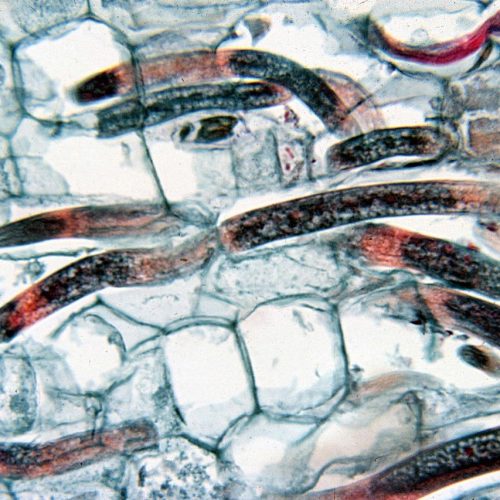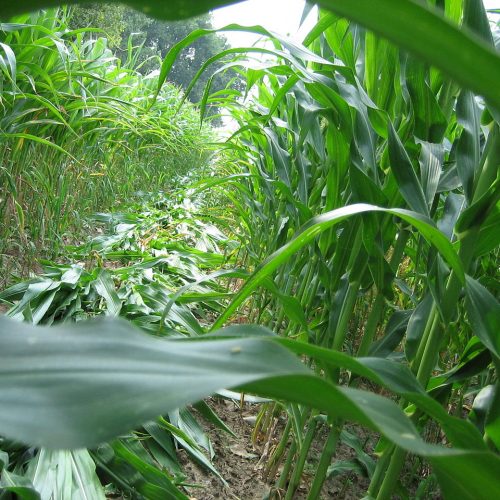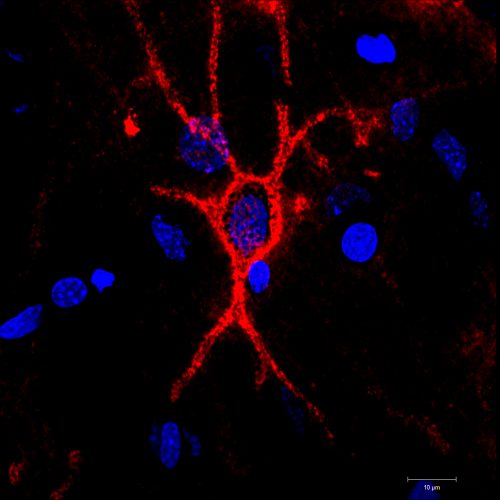All crops have to contend with parasites and pests, whether of the insect or bacterial variety, and farmers have to create multiple methods to protect their crops and farm yields. For legume farmers and the various types of beans they grow, it is the Bruchus family of beetles that continues to be one of the more notorious threats. Some bean crops, such as the common bean (Phaseolus vulgaris), have developed defenses to eliminate the threat that the weevils compose. This has largely been the production of alpha-amylase inhibitors targeted at the Bruchus family and which act as antifeedants by stopping digestive enzymes from absorbing proper nutrients, particularly starch production into glycogen.
For pea farmers, it is the pea weevil that has been the scourge of its agricultural usage and the lack of alpha-amylase inhibitors in pea plants had given them little defense against the pest. The growth of peas as a crop in the Nile delta and up through the Middle East, Asia, and eventually Europe, saw multiples pests arise to feast upon it. However, it was not until its staple usage in Europe in pea soup and other commodities that the native pea weevil began to become a nuisance and worse.
Attempts to breed the inhibitors into peas have been made before, but were largely unsuccessful even with mutation breeding methods. It was not until the advent of biotechnology that more direct means could be used, such as an early endeavor in 1995 to move the gene using complementary DNA (cDNA). While this was achieved, the end product was not useful for human production due to the gene chosen also affecting human alpha-amylase production.[1] Later experiments would work around this problem by being more selective in the gene being transferred in order to only affect the pest weevils.
A later study in 2000 produced by the US National Academy of Sciences looked at two different alpha-amylase inhibitors (named αAI-1 and αAI-2) that had more narrow specificities that would only affect the weevils that fed upon them. They found that the first inhibitor had a 80% effectiveness over a pH range 4.5 to 6.5, while the second had only a 40% effectiveness over a narrower range from only 4.0 to 4.5. Though it was found that they affected weevil larva in differing ways, with the first having a mortality effect early in larval development and the second causing a slowdown in development overall. Combined these separate inhibitors could be used to cover a wider amount of weevils and in isolated ways, so that any mutation that might develop in the weevil population to combat one would likely fall prey to the other.[2]
Laura and Greenfeast are two lines of transgenic peas developed with the αAI-1 gene and were found to have a 93-98% mortality rate against pea weevils, with another Laura line and a line called Dundale that expressed the αAI-2 gene had low weevil mortality, but were able to delay larval development so that they did not reach adulthood even after two and a half months. Due to their specificities, the lines could be used to tackle different kinds of weevil infestations.[3]
Anti-biotechnology organizations have made claims about transgenic peas being harmful, including a June 2015 article by Jeffrey Smith. The article stated that there has been no testing for allergenicity done on transgenic peas and that non-transgenic peas do not cause alpha-amylase allergenic responses. This claim was based on sources that were more than a decade old when the article was published, some nearly two decades old.[4]
While it should be pointed out that allergenicity testing is routinely done for all biotechnology-related crops, a specific comparison of allergenicity was examined in a study published in 2013, two full years before Smith’s article. The study found that transgenic peas do indeed cause the same allergy effect that the common bean does, but also that non-transgenic peas exhibit an allergenic effect due to the pea lectin in peas themselves. These results were directly compared and the amount of response was largely equal between the two, with the alpha-amylase not being any greater in allergenicity than the pea lectin. Thus, this sort of allergenic response is found in all of the related bean species, whether due to the amylase gene itself or due to the lectin production genes.[5]
An official release of alpha-amylase peas is still several years off, depending on country. However, field trials were approved in Germany in November of 2015, so the results and subsequent sale could be as early as 2018.[6] With these peas, one of the main pests for pea farmers could be dealt with and enhance pea production worldwide, especially in Europe where farmers have had to deal with such pests since their first introduction.
References
- Schroeder HE, Gollasch S, Moore A, Tabe LM, Craig S, Hardie DC, Chrispeels MJ, Spencer D, Higgins TJ. 1995. Bean [alpha]-Amylase Inhibitor Confers Resistance to the Pea Weevil (Bruchus pisorum) in Transgenic Peas (Pisum sativum L.). Plant Physiology [accessed 2016 May 16]; 107:1233–1239. http://www.ncbi.nlm.nih.gov/pmc/articles/PMC157257/
- Morton RL, Schroeder HE, Bateman KS, Chrispeels MJ, Armstrong E, Higgins TJ. 2000. Bean α-amylase inhibitor 1 in transgenic peas (Pisum sativum) provides complete protection from pea weevil (Bruchus pisorum) under field conditions. Proceedings of the National Academy of Sciences [accessed 2016 May 16]; 97:3820–3825. http://www.pnas.org/content/97/8/3820.long
- De Sousa-Majer MJ, Hardie DC, Turner NC, Higgins TJ. 2007. Bean alpha-amylase inhibitors in transgenic peas inhibit development of pea weevil larvae. Journal of Economic Entomology [accessed 2016 May 16]; 100:1416–1422. http://www.ncbi.nlm.nih.gov/pubmed/17849896
- Smith JM. 2015 Jun 3. Genetically Modified Peas Caused Dangerous Immune Response in Mice. IRT; [accessed 2016 May 16]. http://responsibletechnology.org/allfraud/507-2/
- Lee RY, Reiner D, Dekan G, Moore AE, Higgins TJ, Epstein MM. 2013. Genetically modified α-amylase inhibitor peas are not specifically allergenic in mice. PLOS One [accessed 2016 May 16]; 8. http://www.ncbi.nlm.nih.gov/pubmed/23326368
- Federal Office of Consumer Protection and Food Safety. 2015 Nov 24. Decision regarding the deliberate release (field trial) of genetically modified pea plants (Pisum sativum L.) pGPTV-BAR::USPPAMYLI issued by the German Competent Authority. Biosafety Clearing House; [accessed 2016 May 16]. https://bch.cbd.int/database/record.shtml?documentid=109547
Written by: Sterling Ericsson
Word Count: 790
Type: News Bite





